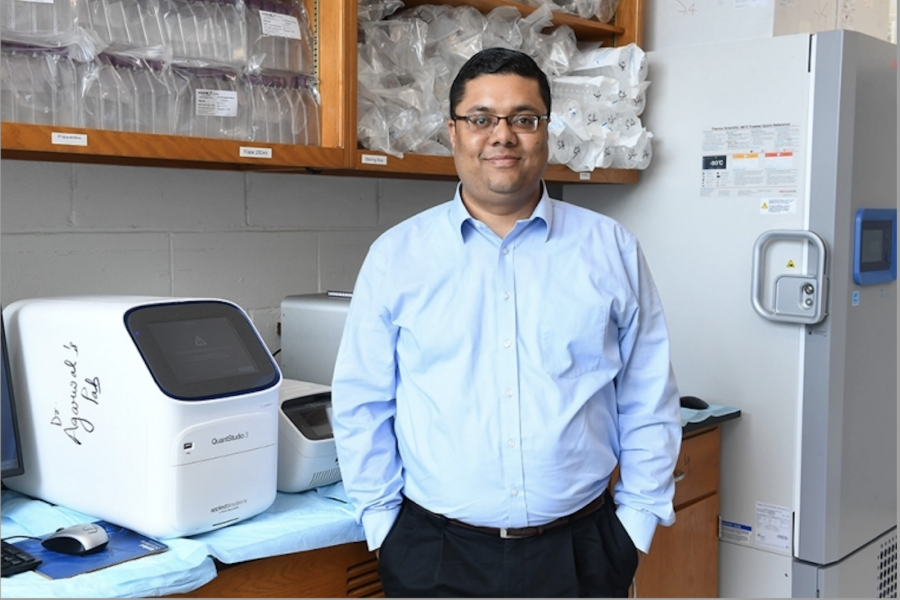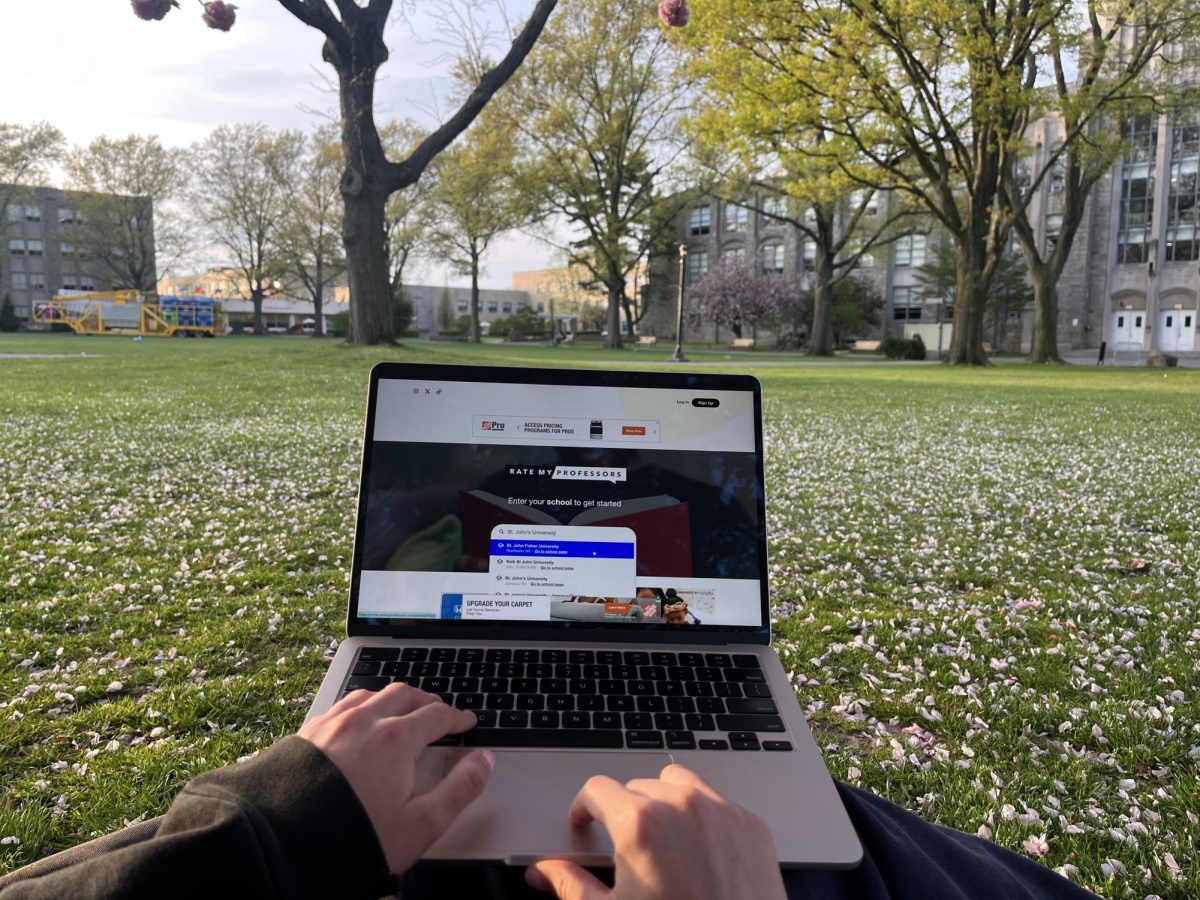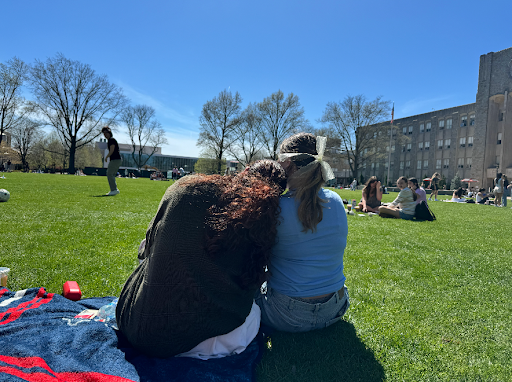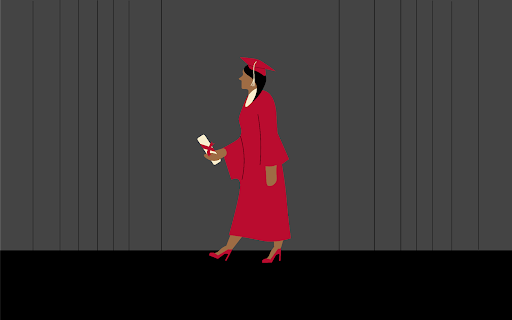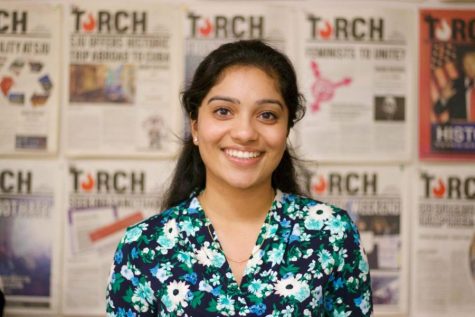Editor’s note: This story has been edited on Feb. 16 to correct the grant amounts mentioned.
By far, the coronavirus is the most prevalent issue of the last year. It has challenged the world to adapt professionally, academically and personally. As of yet, the most promising advancement amidst this crisis is the research. While some labs are working tirelessly to produce a vaccine for COVID-19 to defeat our invisible adversary, others remain determined to find a cure for a much older enemy: Cancer.
Saurabh Agarwal, Ph.D., an assistant professor in the department of Pharmaceutical Sciences, has been working on finding a cure for pediatric neuroblastoma since 2012, a childhood cancer that compromises nerve tissue in the peripheral nervous system, excluding the brain and spinal cord.
Since Agarwal became a faculty member in the College of Pharmacy and Health Sciences back in Fall 2018, he has received grants from numerous organizations, encouraging his ground-breaking work that may save thousands of lives. Just recently, the St. Baldrick’s Foundation –– known for supporting promising research on cures and treatments for all childhood cancers –– awarded him two grants for his research on treating and curing pediatric neuroblastoma. The first is a multi-year grant for $200,000 and the second is the Oliver Wells Fund for Neuroblastoma, a $106,000 grant. Both awards finance his research on pinpointing the causes of relapse in neuroblastoma patients and cultivating targeted therapies.
“St. Baldrick’s grant is the first of its kind in terms of [the] biggest philanthropy grant for pediatric research received by a member of the department,” Vijaya Korlipara, Ph.D., professor and chair of the pharmaceutical sciences department, told the Torch.
Founder of the Pediatric Cancer Research Laboratory at St. John’s, Agarwal has received numerous awards, including David’s Warriors Hero Award, Lerner Family Foundation Award and Villa Joep Foundation Research Excellence Award. He has also been awarded funding and recognition from Wipe Out Kids’ Cancer Foundation. Agarwal is thankful for not only all the financial support from the University but also “his students and mentors for their continued support,” according to the University press release.
The grants that Agarwal has received from philanthropic organizations over the years, including those from the St. Baldrick’s Foundation, are crucial to fund his work because government funding neglects pediatric cancer research. “Our government funding for the pediatric cancer research is almost 20 times low[er] than the adult cancer funding…that is why funding from the philanthropic foundations is becoming very important,” Agarwal said.
Danielle Rouse, a Masters student in Agarwal’s lab since last spring, also emphasizes the importance of receiving funding to further their research efforts. “The funding of Dr Agarwal’s research for the treatment of neuroblastoma is evidence that The St. Baldrick’s Foundation supports and is cognizant of the need for ongoing research, and specifically in the areas of the childhood cancer, neuroblastoma,” said Rouse in a statement to the Torch. “Their support of this worthy cause, not only in the ongoing research to find a cure for childhood cancers, but the funding expands far beyond boundaries in research education and fosters an unequivocal community spirit of unity.”
“I am highly motivated to pursue my neuroblastoma research, especially in light of the stress and suffering these children and their families experience,” Agarwal said in the University press release.
Neuroblastoma is often diagnosed between the first month of life and five years of age, but in rare cases it can even be diagnosed via ultrasound before birth. It accounts for 7-10% of all childhood cancers, but 50% of all infantile cancers, according to St. Jude Children’s Research Hospital. Those with low-risk and intermediate-risk neuroblastoma have a greater chance at being cured than those with high-risk neuroblastoma. Despite being the most common cancer affecting children less than a year old, neuroblastoma still has no cure, a fact Agarwal is hoping to change with his research at St. John’s to help save children and their families from the pain the illness brings.
Agarwal’s neuroblastoma research began 9 years ago after he completed a postdoctoral fellowship in Texas Children’s Cancer Center and Baylor College of Medicine in Houston. It was at the Cancer Center that he interacted with neuroblastoma patients and their physicians. The lack of research on this prevalent pediatric cancer and the suffering Agarwal witnessed in Texas sparked his interest in dedicating his research to treating and curing neuroblastoma.
His efforts culminated in a novel discovery in his Texas-based laboratory.
“Our group was the first group who identified a new neuroblastoma cancer stem-cell subpopulation in these tumors,” Agarwal said in an interview with the Torch.
Before this discovery, little was known about how neuroblastoma manifests itself in the body and how relapse occurs. From their findings, Agarwal said his group was able to explain that neuroblastoma developed “due to the cancer stem cell development.”
Agarwal brought this research with him when he joined the St. John’s faculty and he continues his work on the cancer stem cells, focusing specifically on the cell-membrane marker G-CSF receptor and its ligand, cytokine G-CSF. He explained that “G-CSF is actually also inducing these cancer stem cells and making this therapeutic approach [of prescribing it during chemotherapy] actually really bad.”
In other words, G-CSF might be reversing the effects of the chemotherapy that neuroblastoma patients are receiving. G-CSF has not yet been linked to other cancers, but this is nonetheless a revolutionary finding that brings us one step closer to treating and curing pediatric neuroblastoma.
In hopes of designing a targeted therapeutic molecule that binds to the drug-resistant stem cells, Agarwal is currently collaborating with other cancer research labs on campus, specifically those specializing in medicinal chemistry.. In addition, the papers on G-CSF that Agarwal’s lab published are serving as the basis of a clinical trial at Memorial Sloan Kettering Cancer Center in New York and Texas Children’s Hospital.
As an assistant professor, Agarwal loves teaching his undergraduate students in his Clinical Immunology and Introduction to Pharmacology classes. He knows his hard work has paid off when he sees his students’ “glittering faces when they start to see the connection” between their lectures and his clinical research.
“I really enjoy working with undergraduate students,” he said. “I feel that due to this research, we will be able to educate more and more people. Also, we will be able to make this interesting for the people to learn and talk about pediatric cancer.”
Agarwal’s research has not only inspired undergraduate students, but has also motivated graduate students to join his lab to contribute to the ongoing research and help reinforce their interests. Rouse’s work with Agarwal has not only “solidified [her] interest in the cancer biology field,” but has also allowed her to contribute to pharmacology research using her background in Toxicology.
“The research methodologies employed under the guidance of Dr. Agarwal has given me a new perspective in research and helped to solidify my research objectives of being a renowned Pharmacologist,” said Rouse.
“Thank you so much for supporting Dr. Agarwal,” said Rameswari Chilamakuri, a Ph.D. student in Agarwal’s lab, in an email interview with the Torch. “We are and will be working hard to find…novel therapeutic approaches…to treat Neuroblastoma.”
The battle against cancer is nowhere near finished, but with continued support, labs such as Agarwal’s can soldier on and search for a cure.













